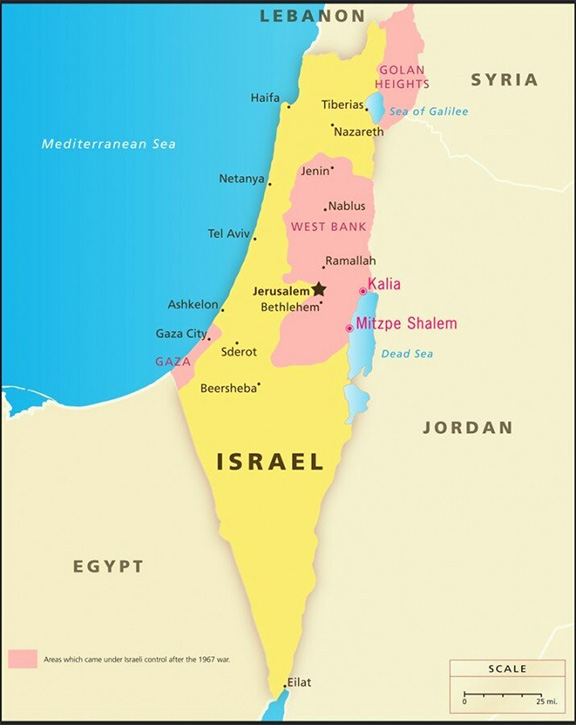International Relations
Al-Aqsa Mosque & Sheikh Jarrah: Israel-Palestine
- 13 May 2021
- 6 min read
Why in News
Recently, Israeli armed forces attacked Al-Aqsa Mosque in the Haram esh-Sharif in Jerusalem, ahead of a march by Zionist nationalists commemorating Israel’s capture of the eastern half of the city in 1967.
- The threatened eviction of dozens of Palestinian families in the East Jerusalem neighborhood of Sheikh Jarrah escalated the crisis further.
- Zionism is a worldwide Jewish movement that resulted in the establishment and development of the state of Israel and that now supports the state of Israel as a Jewish homeland.
Key Points
- Al-Aqsa Mosque:
- It is one of the holiest structures in the Islamic faith. It sits inside a 35-acre site known by Muslims as Haram al-Sharif, or the Noble Sanctuary, and by Jews as the Temple Mount.
- The site is part of the Old City of Jerusalem, sacred to Christians, Jews and Muslims.
- It is believed to have been completed early in the eighth century and faces the Dome of the Rock, the golden-domed Islamic shrine that is a widely recognized symbol of Jerusalem.
- The United Nations Educational, Scientific and Cultural Organization, UNESCO, has classified the Old City of Jerusalem and its walls as a World Heritage Site.
- It is one of the holiest structures in the Islamic faith. It sits inside a 35-acre site known by Muslims as Haram al-Sharif, or the Noble Sanctuary, and by Jews as the Temple Mount.
- Conflict over Jerusalem:
- Jerusalem has been at the centre of the Israeli-Palestinian conflict. According to the original 1947 United Nations (UN) partition plan, Jerusalem was proposed to be an international city.
- But in the first Arab Israel war of 1948, the Israelis captured the western half of the city, and Jordan took the eastern part, including the Old City that houses Haram al-Sharif.
- Israel captured East Jerusalem from Jordan in the Six-Day War 1967 and annexed it later.
- Since its annexation, Israel has expanded settlements in East Jerusalem.
- Israel sees the whole city as its “unified, eternal capital”, whereas the Palestinian leadership across the political spectrum have maintained that they would not accept any compromise formula for the future Palestinian state unless East Jerusalem is its capital.
- Sheikh Jarrah Issue:
- Hundreds of thousands of Palestinians were forced out of their homes when the State of Israel was created in historical Palestine in 1948.
- Twenty-eight of those Palestinian families moved to Sheikh Jarrah in East Jerusalem to settle there.
- In 1956, when East Jerusalem was ruled by Jordan, the Jordanian Ministry of Construction and Development and the UN Relief and Works Agency facilitated the construction of houses for these families in Sheikh Jarrah. But Israel would capture East Jerusalem from Jordan in 1967.
- By the early 1970s, Jewish agencies started demanding the families leave the land.
- Earlier this year (2021), the Central Court in East Jerusalem upheld a decision to evict four Palestinian families from their homes in Sheikh Jarrah in favor of Jewish settlers.
- The issue remains unresolved and potentially inflammable.
- Hundreds of thousands of Palestinians were forced out of their homes when the State of Israel was created in historical Palestine in 1948.
- India’s Stand on Israel-Palestine Issue:
- India recognised Israel in 1950 but it is also the first non-Arab country to recognise Palestine Liberation Organisation (PLO) as the sole representative of the Palestinian.
- India is also one of the first countries to recognise the statehood of Palestine in 1988.
- In 2014, India favored UNHRC’s resolution to probe Israel’s human rights violations in Gaza. Despite supporting the probe, India abstained from voting against Israel in UNHRC in 2015.
- As a part of Link West Policy, India has de-hyphenated its relationship with Israel and Palestine in 2018 to treat both the countries mutually independent and exclusive.
- In June 2019, India voted in favor of a decision introduced by Israel in the UN Economic and Social Council (ECOSOC) that objected to granting consultative status to a Palestinian non-governmental organization.
- So far India has tried to maintain the image of its historical moral supporter for Palestinian self-determination, and at the same time to engage in the military, economic, and other strategic relations with Israel.
- India recognised Israel in 1950 but it is also the first non-Arab country to recognise Palestine Liberation Organisation (PLO) as the sole representative of the Palestinian.
- Related Developments:
- In March 2021, International Criminal Court (ICC) launched investigatations into the war crimes in Palestinian territories occupied by Israel (West Bank and the Gaza Strip).
- In April 2021, the US restored at least USD 235 million in financial assistance to the Palestinians.
Way Forward
- The world at large needs to come together for a peaceful solution but the reluctance of the Israeli government and other involved parties have aggravated the issue more. Thus a balanced approach would help to maintain favorable relations with Arab countries as well as Israel.
- The recent normalization agreements between Israel and the UAE, Bahrain, Sudan, and Morocco, known as the Abraham Accords, are the steps in the right direction. All regional powers should envisage peace between the two countries on line of Abraham Accords.





